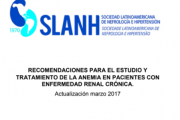Confirmed clinical case of chronic kidney disease of nontraditional causes in agricultural communities in Central America: a case definition for surveillance
Alejandro Ferreiro, Guillermo Álvarez-Estévez, Manuel Cerdas-Calderón, Zulma Cruz-Trujillo, Elio Mena,5 Marina Reyes, Mabel Sandoval-Diaz, Vicente Sánchez-Polo, Régulo Valdés, and Pedro Ordúnez
Over the last 20 years, many reports have described an excess of cases of chronic kidney disease (CKD) in the Pacific coastal area of Central America, mainly affecting male farmworkers and signaling a serious public health problem. Most of these cases are not associated with traditional risk factors for CKD, such as aging, diabetes mellitus, and hypertension. This CKD of nontraditional causes (CKDnT) might be linked to environmental and/or occupational exposure or working conditions, limited access to health services, and poverty. In response to a resolution approved by the Directing Council of the Pan American Health Organization (PAHO) in 2013, PAHO, the U.S. Centers for Disease Control and Prevention, and the Latin American Society of Nephrology and Hypertension (SLANH) organized a consultation process in order to expand knowledge on the epidemic of CKDnT and to develop appropriate surveillance instruments. The Clinical Working Group from SLANH was put in charge of finding a consensus definition of a confirmed clinical case of CKDnT. The resulting definition establishes mandatory criteria and exclusion criteria necessary for classifying a case of CKDnT. The definition includes a combination of universally accepted definitions of CKD and the main clinical manifestations of CKDnT. Based on the best available evidence, the Clinical Working Group also formulated general recommendations about clinical management that apply to any patient with CKDnT. Adhering to the definition of a confirmed clinical case of CKDnT and implementing it appropriately is expected to be a powerful instrument for understanding the prevalence of the epidemic, evaluating the results of interventions, and promoting appropriate advocacy and planning efforts




